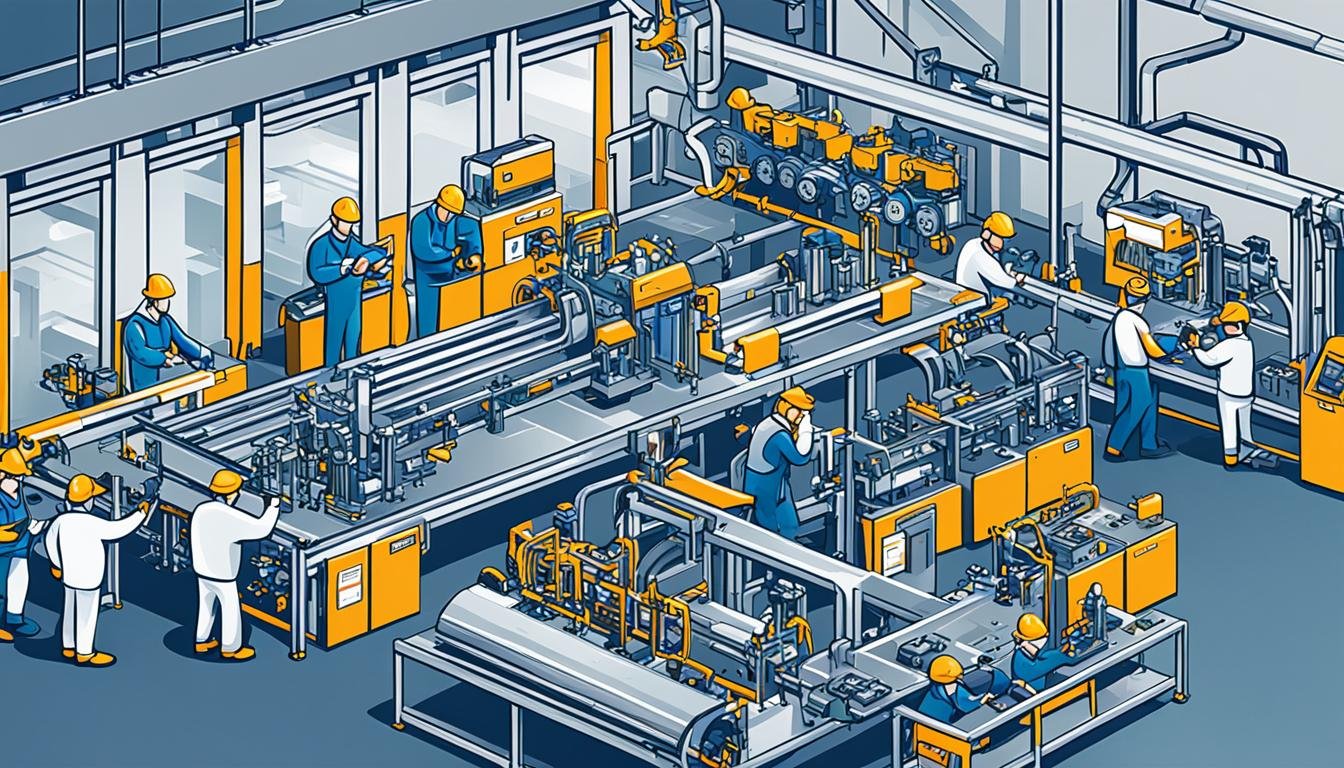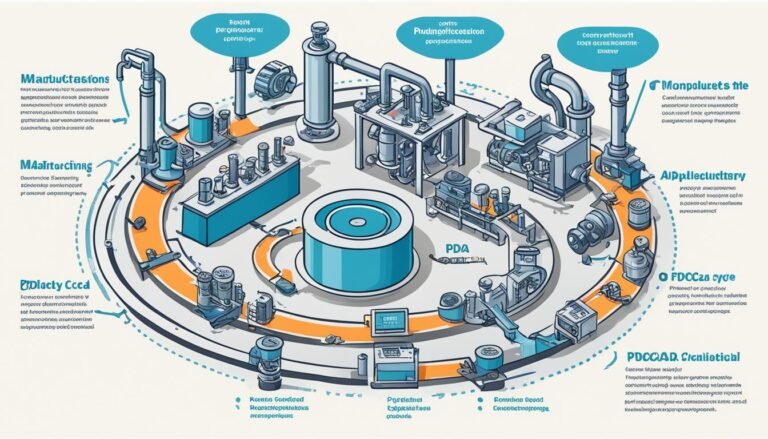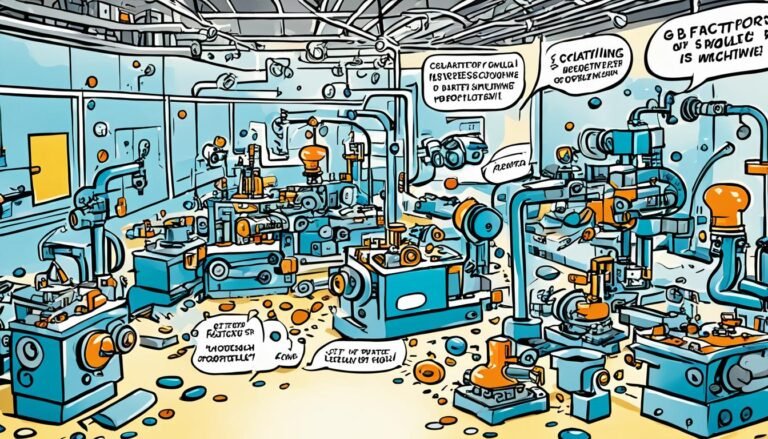Time Management and Productivity Tips for Manufacturing Professionals
Did you know that up to 95 percent of college students report procrastinating within a given day? This issue isn’t just for students; it affects manufacturing too. In manufacturing, delays and inefficiencies can cost a lot of time and money. That’s why managing your time well is key to making things run smoothly.
In manufacturing, being efficient and productive depends on managing your time well. With so many tasks to handle, missing messages and deadlines is easy. That’s why using structured time management strategies is a must. Tools like timeboxing and Asana help keep things in order.
These methods fit well with lean manufacturing and make work flow better. They help you focus on what’s important each day. This leads to a better balance between work and life, less stress, and more productivity for manufacturing pros.
Key Takeaways
- Procrastination affects up to 95% of people, impacting productivity.
- Time management is crucial for enhancing manufacturing efficiency and minimizing bottlenecks.
- Structured strategies like timeboxing and tools like Asana can optimize workflows.
- Multitasking is ineffective, with only 2% of people capable of doing it well.
- Balancing work-life through effective time management reduces stress and improves productivity.
Understanding the Importance of Time Management in Manufacturing
In manufacturing, managing time well is key to doing better and working more efficiently. Using good time management helps with task prioritization, making workflows smoother through lean manufacturing, and managing workflow better. This makes every minute count, helping both your work and personal life.
A study by Think Money found that distractions take up to three hours a day for many workers. This shows how important good time management is. Learning to manage time well makes workers more dependable, helps them meet deadlines, and improves their work-life balance. Small businesses and freelancers especially need to use their time wisely to grow.
Good time management has many benefits, like less stress, more energy, and staying focused on goals. People who manage their time well have more free time, get more done, and feel better about themselves (Dodd and Sundheim, 2005). It also helps in getting new clients and keeping current ones, showing its value for success over time.
Planning the day carefully with tools like planners, calendars, and apps helps workers see where they spend their time. These tools show how to use time better, making it easier to manage it well. Scheduling tasks during your most productive hours makes you work more efficiently.
Sorting tasks by how urgent and important they are is a good way to prioritize, as Covey, Merrill, and Merrill suggested in 1994. This way, important tasks for the business get done first. Delegating tasks also lets you focus on what’s most important, making you more productive.
Being disorganized and trying to do too many things at once can hurt your time management. Doing many tasks at once can make it hard to finish them well, lowering productivity. Keeping your workspace tidy and handling distractions like phones and emails better can make you work faster and avoid delays.
Managing your time well makes you feel accomplished, boosts your confidence, and motivates you to get better at it. It helps you stay focused at work, reaching your goals without giving up your personal life. For small businesses and their employees, managing time and money well leads to growth that lasts.
Knowing how important time management is also helps keep manufacturing workflows running smoothly. Improving processes saves time. Clear communication and an organized workspace make sure everyone has what they need, cutting down on wasted time and delays.
Effective Workflow Management Techniques
For manufacturing pros, managing workflow well is key to boosting productivity and making operations smoother. Using different methods and the right tools can lead to big improvements.
Lean Manufacturing Principles
Lean manufacturing focuses on cutting waste and boosting efficiency. It’s vital for making processes better. By using lean, companies make sure every step in making things adds value. This leads to more work done and lower costs.
About 70% of companies that use automation to optimize their workflows see shorter processing times and better output efficiency.
Timeboxing and Time Blocking Strategies
Timeboxing and time blocking are great for managing time better. Timeboxing sets a fixed time for tasks to keep work focused and intentional. Time blocking sets aside specific times for certain tasks, helping with deep work.
These methods cut down on distractions and help you concentrate better. This leads to better tracking of time and more productivity.
Utilizing Task Management Tools
Task management tools are crucial for today’s manufacturing. They show tasks visually, helping people prioritize and link daily tasks with big company goals. For example, Asana helped a tech startup finish projects 25% faster and boost team productivity a lot.
Using these tools can make projects run smoother and improve how teams talk to each other.
| Benefits | Statistics |
|---|---|
| Projects meeting original goals | 35% increase |
| Reduction in project failures | 30% decrease |
| Improved productivity | 25% enhancement |
| Efficiency in task management | Significant improvement |
Using lean manufacturing, timeboxing, time blocking, and task management tools is key for the best process optimization. These methods make tasks smoother and give a clear plan of action. This leads to more work done, less stress, and better productivity for manufacturing pros.
Implementing Task Prioritization and Resource Allocation
Learning how to prioritize tasks and manage resources is key for manufacturing pros. Using tools like the Eisenhower Matrix helps them sort tasks by urgency and importance. This way, they can work more efficiently and get better results.
The Eisenhower Matrix for Task Prioritization
The Eisenhower Matrix is a tool named after the 34th U.S. President. It sorts tasks into four areas based on urgency and importance:
- Do: Tasks that are urgent and important. These need attention right away.
- Defer: Tasks that are important but not urgent. These can wait.
- Delegate: Tasks that are urgent but not important. Give these to others.
- Delete: Tasks that are neither urgent nor important. Get rid of these to save time.
Using the Eisenhower Matrix, manufacturing pros can focus on the most critical tasks first. This keeps their schedules on track and helps use resources wisely. It makes sure people and materials are used for tasks that matter most.
Efficient Resource Allocation
Getting resources to the right place is key in manufacturing to stay productive and hit goals. Good resource allocation means:
- Tasks are given to people based on their skills.
- Deadlines are set to avoid overloading.
- Timelines are clear to track progress and keep everyone accountable.
The Pickle Jar Theory helps by sorting tasks into distractions, non-urgent tasks, and key tasks. This way, focusing on what’s most important becomes easier. Techniques like Kanban and Time Blocking also help in prioritizing tasks and managing resources well.
By using smart task prioritization and resource management, professionals can make their work flow better. This leads to more productivity in their manufacturing tasks.
Time Management and Productivity Tips for Manufacturing Professionals
Manufacturing pros have a tough time managing their work. With so many distractions, it’s hard to stay focused. These tips aim to help you cut down on distractions and boost your productivity. This way, you can keep up with your tasks and still take care of yourself.
Reducing Distractions and Enhancing Focus
On average, employees get distracted about 56 times a day. This hurts productivity in manufacturing. To fight this, set clear work boundaries and keep your workspace free from interruptions. Tools like Trello, Slack, and Google Calendar help you stay on track by organizing your tasks and keeping in touch with others. Also, the Toyota Production System’s continuous improvement can help you check your time use and cut out distractions.
Using the Pomodoro Method
The Pomodoro Method is a great way to stay focused. It involves working in 25-minute blocks, followed by short breaks. This cycle helps you stay productive and avoid burnout. In 2020, 71% of knowledge workers felt burned out because they couldn’t manage their time well. Using this method can change your workday for the better, making tasks easier to handle and boosting your sense of achievement.
Applying the Pareto Principle
The Pareto Principle, or 80/20 rule, says 80% of results come from 20% of efforts. For manufacturing pros, this means focusing on the key tasks that matter most. By regularly checking how you spend your time and aligning your work with company goals, you can work smarter and more efficiently. This idea fits well with the Toyota Production System’s focus on making things better and more effective.
Source Links
- 5 time management tips every manufacturer can benefit from
- 9 Time Management and Productivity Tips for Energy Professionals
- Time Management Tips for Professionals – Tools & Habits | CurrentWare
- The Importance of Time Management: Tips for Productivity
- Time Management: 10 Strategies for Better Time Management
- Time Management Tips That Can Help You Thrive in a Manufacturing Job
- Mastering Workflow: Advanced Task Management Strategies for Peak Team Productivity
- Unlock Success With These 7+ Workflow Management Tips To Get Ahead | Quixy
- Key Tips to Manage Your Workflows & Improve Their Efficiency
- Time Management Skills, Techniques and Strategies – The Ultimate List | My Hours
- How to Create Priority Management Process | Cultivate Advisors
- Leadership and Time Management: Mastering the Art of Prioritization
- 18 Time Management Tips to Boost Productivity [2024] • Asana
- Practical Tips for Time Management at Work
- 21+ Best Time Management Activities for Highly Productive Teams







